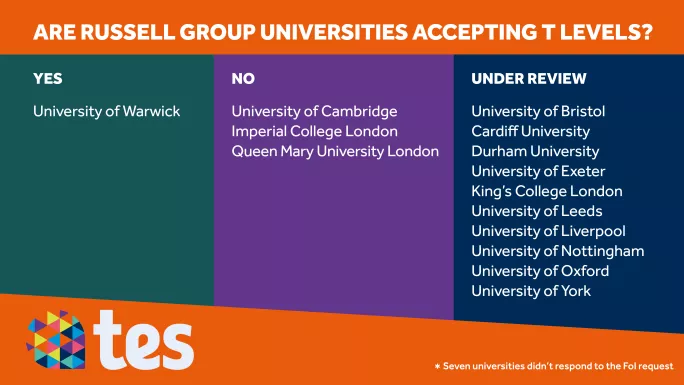- Home
- 3 leading universities say they won’t accept T levels
3 leading universities say they won’t accept T levels

Three Russell Group universities - among them the University of Cambridge - have said they will not be accepting T levels as entry qualifications on a par with A levels for undergraduate courses from 2022.
Imperial College London and Queen Mary University London also told Tes that they would not be accepting the new “gold standard” qualifications, launched this month.
Last year, the Department for Education confirmed that T levels would be awarded the same UCAS points as A levels, with a distinction* in a T level equal to three A*s at A level.
News: Two more providers delay T level delivery to 2021
More: Welcome to education’s newest exclusive club: T levels
Background: T levels distinction will have same Ucas points as 3As
From this week, 44 colleges and education providers in England will be delivering the new qualifications, with the first three T-level pathways taught being education and childcare, construction and digital.
But as students start these courses, it is unclear whether or not some of the leading universities in the UK will accept them as entry qualifications.
A Freedom of Information request of Russell Group universities by Tes, to which 14 responded within the deadline, found that while three were not planning to accept T levels, the majority (10) is yet to make a decision, telling Tes they are awaiting further specifications and details. Only the University of Warwick said it would consider T levels as an entry qualification for starts in 2022.
A spokesperson for the University of Cambridge said the three initial subjects in which T levels could be taken would not be a natural fit with any subjects offered at Cambridge. They added: “We will continue to review our admissions policy in relation to T levels as new subjects become available.”
And a spokesperson for the University of Oxford said that while it could not “say exactly how any qualification will be viewed from 2022”, “as T levels are technical and vocational qualifications, it is unlikely that they will be suitable for entry to the highly academic degree courses at Oxford”.

“Young people have a right to know”
Nick Hillman, director of the Higher Education Policy Institute, told Tes that, for students’ sake, universities needed to make their positions clear.
He said: “You’re selling a qualification to 16-year-olds that might close off some routes that they are interested in. Young people have the right to know what the likely consequences of their decisions are and if one of the consequences of choosing T levels over A levels or BTECs is to shut off some important routes to them, they have a right to know that.
“The risk is young people will be told that T levels are worth a certain number of UCAS points and they will think that means all universities on the UCAS system will give them equal value, which clearly is not the case.
“It’s frustrating for universities to say we don’t have enough information yet, when people are literally learning these syllabuses now. I’d urge them to start an urgent conversation with the Department for Education.”
Mr Hillman added that Cambridge has a big education department where hundreds of primary teachers are trained each year. He said that while it was in a university’s right to say no to various qualifications, he would urge them to constantly review and reconsider.
He said: “It’s good when universities take a wide range of entry qualifications seriously - they are very willing to do that when it comes to international students - because it helps their access data for university. It’s not delivering diversity in the classroom for the sake of it, we know that classrooms with more diversity deliver a better learning environment.”
“A moving picture”
Cath Sezen, senior policy manager at the Association of Colleges, said that as the T levels were rolled out, she hoped that universities would see the value in them.
She said: “This will be a moving picture. The first graduates will be looking to move on in 2022, and I’d like to hope as we go forward, people will see the value in T levels. They are really substantive courses, they offer the industry placement, the proof will be in the pudding. As we see more young people choosing to take T levels, and it becomes more mainstream, we will hopefully see that universities will see the value and the worth.”
She also said that despite the uncertainty from Russell Group universities, T-level students had many progress options available to them.
“We need to bear in mind that higher education progression is not the only progression route for T levels. We know that higher technical qualifications will be coming on board, HNCs and HNDs are really valuable qualifications. There are higher-level apprenticeships too.
“You could argue that the progression options for T level students are more varied than people who have chosen to do three A levels.”
Gillian Keegan, the apprenticeships and skills Minister said: “T levels are our pioneering new high-quality, employer-led technical courses that will give young people a head start in their careers.
“We are working with a number of Russell Group universities who have expressed their support for T levels. It is important to recognise that T levels will provide students with the skills they need to excel in technical courses such as building surveying and design and digital production media, allowing learners to build a strong specialism in their area of study.
“The technical qualification specifications for the first three T levels are now available and have been well received by a number of universities; we expect them to confirm their admissions policies over the coming months.”
Keep reading for just £1 per month
You've reached your limit of free articles this month. Subscribe for £1 per month for three months and get:
- Unlimited access to all Tes magazine content
- Exclusive subscriber-only stories
- Award-winning email newsletters



